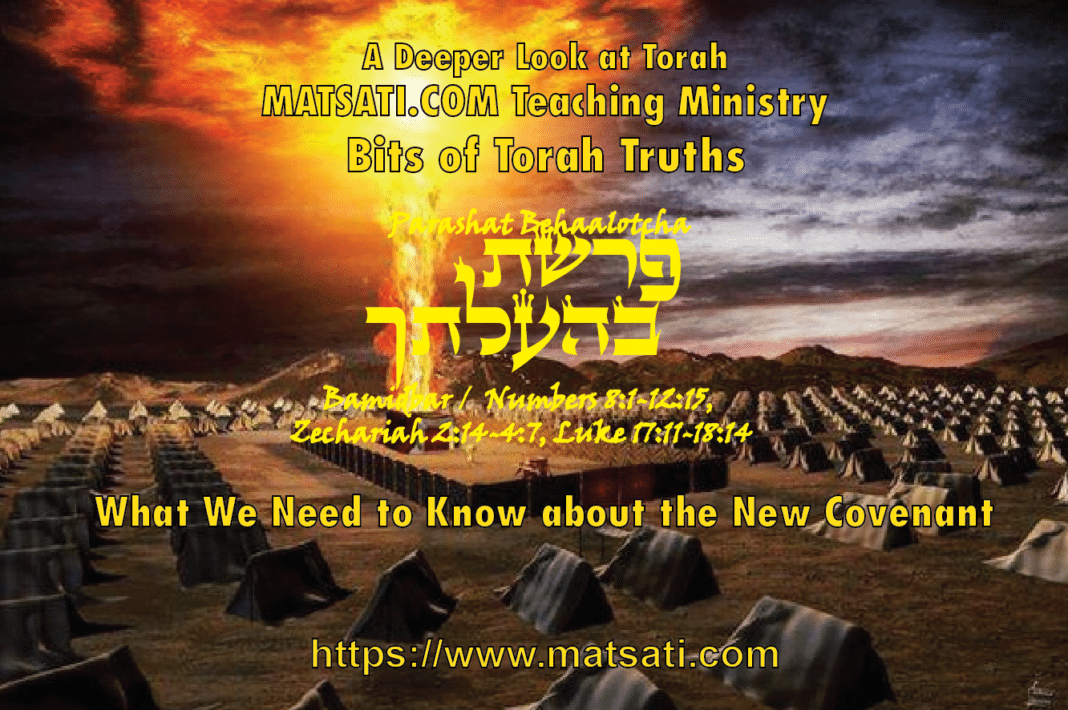This week’s Torah Portion, Parashat Behaalotcha, describes the seven golden lamps (8:1-4), the cleansing of the Levites for service, (8:5-22), when the Levites were to retire from work (8:23-26), the Passover (9:1-14), the Cloud on the Tabernacle (9:15-23), and the Silver Trumpets (10:1-10). We also read about Israel leaving the mountain of Sinai (10:11-36), the people complain (11:1-9), then Moshe complains to the Lord about the people (11:10-15), the Seventy leaders assist Moshe (11:16-30), and the Lord brings Quail and then a plague (11:31-35). Lastly, we read how Miriam and Aaron Murmur against Moshe over the Cushite woman (12:1-15). The Scriptures that speaks to us today this time through are from Bamidbar / Numbers 9:15-18, טו וּבְיוֹם הָקִים אֶת-הַמִּשְׁכָּן כִּסָּה הֶעָנָן אֶת-הַמִּשְׁכָּן לְאֹהֶל הָעֵדֻת וּבָעֶרֶב יִהְיֶה עַל-הַמִּשְׁכָּן כְּמַרְאֵה-אֵשׁ עַד-בֹּקֶר: טז כֵּן יִהְיֶה תָמִיד הֶעָנָן יְכַסֶּנּוּ וּמַרְאֵה-אֵשׁ לָיְלָה: יז וּלְפִי הֵעָלוֹת הֶעָנָן מֵעַל הָאֹהֶל וְאַחֲרֵי כֵן יִסְעוּ בְּנֵי יִשְֹרָאֵל וּבִמְקוֹם אֲשֶׁר יִשְׁכָּן-שָׁם הֶעָנָן שָׁם יַחֲנוּ בְּנֵי יִשְֹרָאֵל: יח עַל-פִּי יְהֹוָה יִסְעוּ בְּנֵי יִשְֹרָאֵל וְעַל-פִּי יְהוָֹה יַחֲנוּ כָּל-יְמֵי אֲשֶׁר יִשְׁכֹּן הֶעָנָן עַל-הַמִּשְׁכָּן יַחֲנוּ: 9:15 Now on the day that the tabernacle was erected the cloud covered the tabernacle, the tent of the testimony, and in the evening it was like the appearance of fire over the tabernacle, until morning. 9:16 So it was continuously; the cloud would cover it by day, and the appearance of fire by night. 9:17 Whenever the cloud was lifted from over the tent, afterward the sons of Israel would then set out; and in the place where the cloud settled down, there the sons of Israel would camp. 9:18 At the command of the Lord the sons of Israel would set out, and at the command of the Lord they would camp; as long as the cloud settled over the tabernacle, they remained camped. (NASB) We note how the text is written, saying וּבָעֶרֶב יִהְיֶה עַל-הַמִּשְׁכָּן כְּמַרְאֵה-אֵשׁ עַד-בֹּקֶר “and in the evening it was like the appearance of fire over the tabernacle, until morning.” Comparing the Masoretic Text to the Aramaic Translation, the Targum Onkelos, he translates this as the following:
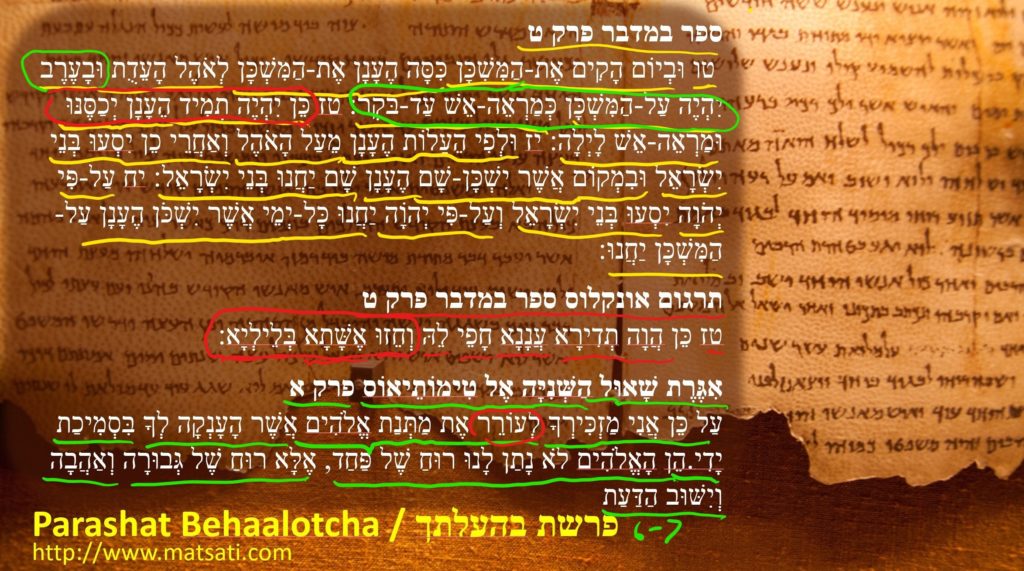
תרגום אונקלוס ספר במדבר פרק ט
טז כֵּן הֲוָה תְדִירָא עֲנָנָא חָפֵי לֵהּ וְחֵזוּ אֶשָּׁתָא בְּלֵילְיָא:
Targum Onkelos on Numbers 9:16
9:16 So was it continually, a Cloud of Glory covering it by day, and a vision of Fire by night.
The interesting part is Onkelos writes וְחֵזוּ אֶשָּׁתָא בְּלֵילְיָא “and there was a vision of fire at night.” When we think about this phenomenon of the cloud during the day and of fire by night, covering the Mishkhan (Tabernacle), one would think seeing these things daily would have caused the people of Israel to be more humble before the Lord and lead them in seeking Him as God Himself was literally providing a manifestation of his presence! When we read Targum Onkelos, it becomes a little more clear as to what was going on. Onkelos has this idea of seeing a vision of fire at night. The seeing of a vision is something that is given only to a few and not to many. Bamidbar / Numbers 9:15 states וּבְיוֹם הָקִים אֶת-הַמִּשְׁכָּן does this mean it only happened on that day only? Bamidbar / Numbers 9:16 states כֵּן יִהְיֶה תָמִיד הֶעָנָן יְכַסֶּנּוּ the cloud continually covered, so this was an ongoing thing during the wilderness journey. These things remind us of what Paul wrote in 2 Timothy 1:6-7, עַל כֵּן אֲנִי מַזְכִּירְךָ לְעוֹרֵר אֶת מַתְּנַת אֱלֹהִים אֲשֶׁר הָעָנְקָה לְךָ בִּסְמִיכַת יָדִי.הֵן הָאֱלֹהִים לֹא נָתַן לָנוּ רוּחַ שֶׁל פַּחַד, אֶלָּא רוּחַ שֶׁל גְּבוּרָה וְאַהֲבָה וְיִשּׁוּב הַדַּעַת. 1:6 For this reason I remind you to kindle afresh the gift of God which is in you through the laying on of my hands. 1:7 For God has not given us a spirit of timidity, but of power and love and discipline. (NASB) Here Paul reminds Timothy saying, אֲנִי מַזְכִּירְךָ לְעוֹרֵר אֶת מַתְּנַת אֱלֹהִים to wake up the gift of God that is within. We note the Greek New Testament, SBL Edition writes “… ἀναμιμνῄσκω σε ἀναζωπυρεῖν τὸ χάρισμα τοῦ θεοῦ…” reminding to “kindel (ἀναζωπυρεῖν) the gift (χάρισμα) of God.” To kindle draws in the context of the remains of a fire or embers, which are used to light up a new fire. Paul speaks of the power of God in our lives as setting us on fire for His way of life, His truth, His judgments, His commands. These things parallel what we are reading in this week’s Torah portion, as the miracle God performed for the people in the vision of fire at night, and the daily provision of food (manna) the bread which is from heaven.
The verses we are looking at for this week are from Bamidbar / Numbers 9:15-23.
ספר במדבר פרק ט
טו וּבְיוֹם הָקִים אֶת-הַמִּשְׁכָּן כִּסָּה הֶעָנָן אֶת-הַמִּשְׁכָּן לְאֹהֶל הָעֵדֻת וּבָעֶרֶב יִהְיֶה עַל-הַמִּשְׁכָּן כְּמַרְאֵה-אֵשׁ עַד-בֹּקֶר: טז כֵּן יִהְיֶה תָמִיד הֶעָנָן יְכַסֶּנּוּ וּמַרְאֵה-אֵשׁ לָיְלָה: יז וּלְפִי הֵעָלוֹת הֶעָנָן מֵעַל הָאֹהֶל וְאַחֲרֵי כֵן יִסְעוּ בְּנֵי יִשְֹרָאֵל וּבִמְקוֹם אֲשֶׁר יִשְׁכָּן-שָׁם הֶעָנָן שָׁם יַחֲנוּ בְּנֵי יִשְֹרָאֵל: יח עַל-פִּי יְהֹוָה יִסְעוּ בְּנֵי יִשְֹרָאֵל וְעַל-פִּי יְהוָֹה יַחֲנוּ כָּל-יְמֵי אֲשֶׁר יִשְׁכֹּן הֶעָנָן עַל-הַמִּשְׁכָּן יַחֲנוּ: יט וּבְהַאֲרִיךְ הֶעָנָן עַל-הַמִּשְׁכָּן יָמִים רַבִּים וְשָׁמְרוּ בְנֵי-יִשְֹרָאֵל אֶת-מִשְׁמֶרֶת יְהוָֹה וְלֹא יִסָּעוּ: כ וְיֵשׁ אֲשֶׁר יִהְיֶה הֶעָנָן יָמִים מִסְפָּר עַל-הַמִּשְׁכָּן עַל-פִּי יְהוָֹה יַחֲנוּ וְעַל-פִּי יְהוָֹה יִסָּעוּ: כא וְיֵשׁ אֲשֶׁר יִהְיֶה הֶעָנָן מֵעֶרֶב עַד-בֹּקֶר וְנַעֲלָה הֶעָנָן בַּבֹּקֶר וְנָסָעוּ אוֹ יוֹמָם וָלַיְלָה וְנַעֲלָה הֶעָנָן וְנָסָעוּ: כב אוֹ-יֹמַיִם אוֹ-חֹדֶשׁ אוֹ-יָמִים בְּהַאֲרִיךְ הֶעָנָן עַל-הַמִּשְׁכָּן לִשְׁכֹּן עָלָיו יַחֲנוּ בְנֵי-יִשְֹרָאֵל וְלֹא יִסָּעוּ וּבְהֵעָלֹתוֹ יִסָּעוּ: כג עַל-פִּי יְהוָֹה יַחֲנוּ וְעַל-פִּי יְהוָֹה יִסָּעוּ אֶת-מִשְׁמֶרֶת יְהוָֹה שָׁמָרוּ עַל-פִּי יְהוָֹה בְּיַד-מֹשֶׁה:
Bamidbar / Numbers 9:15-23
9:15 Now on the day that the tabernacle was erected the cloud covered the tabernacle, the tent of the testimony, and in the evening it was like the appearance of fire over the tabernacle, until morning. 9:16 So it was continuously; the cloud would cover it by day, and the appearance of fire by night. 9:17 Whenever the cloud was lifted from over the tent, afterward the sons of Israel would then set out; and in the place where the cloud settled down, there the sons of Israel would camp. 9:18 At the command of the Lord the sons of Israel would set out, and at the command of the Lord they would camp; as long as the cloud settled over the tabernacle, they remained camped. 9:19 Even when the cloud lingered over the tabernacle for many days, the sons of Israel would keep the Lord’s charge and not set out. 9:20 If sometimes the cloud remained a few days over the tabernacle, according to the command of the Lord they remained camped. Then according to the command of the Lord they set out. 9:21 If sometimes the cloud remained from evening until morning, when the cloud was lifted in the morning, they would move out; or if it remained in the daytime and at night, whenever the cloud was lifted, they would set out. 9:22 Whether it was two days or a month or a year that the cloud lingered over the tabernacle, staying above it, the sons of Israel remained camped and did not set out; but when it was lifted, they did set out. 9:23 At the command of the Lord they camped, and at the command of the Lord they set out; they kept the Lord’s charge, according to the command of the Lord through Moses. (NASB)
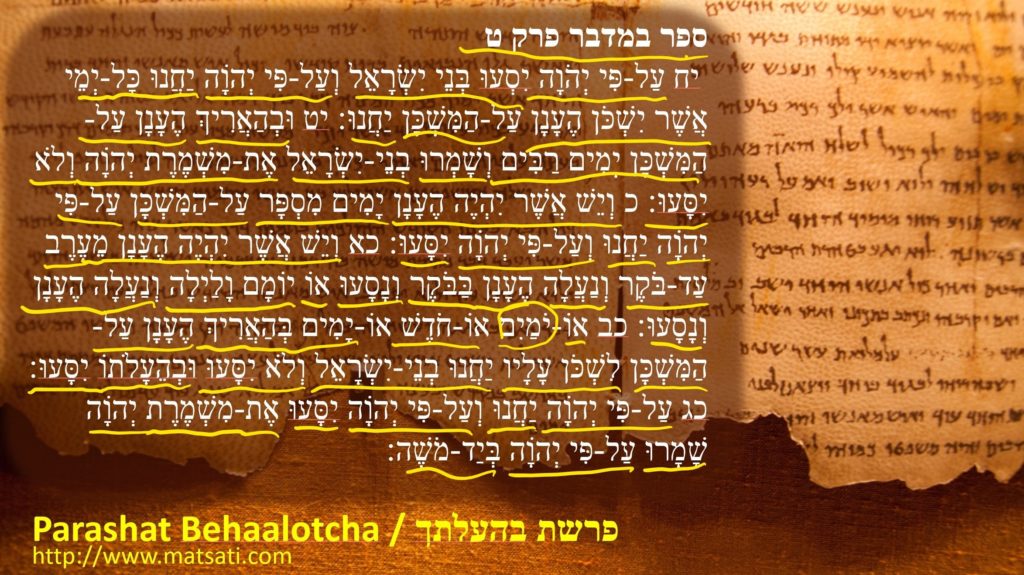
The Torah speaks to how powerfully God worked in the midst of the people of Israel, and even as Him being present, the scriptures allude to the idea that God gave a special revelation to those who were willing to draw near to Him! This is illustrated by comparing the Hebrew and Aramaic Bibles as describing the glory of God in the cloud during the day and fire during the night. Onkelos tells us that the fire at night was a vision of fire. This illustrates how God works, as we draw near, He manifests Himself in a very powerful way when we seek His guidance in our lives. This intimate interaction of the Lord God of Israel is what is being revealed to us according to Bamidbar / Numbers 9:18-23,יח עַל-פִּי יְהֹוָה יִסְעוּ בְּנֵי יִשְֹרָאֵל וְעַל-פִּי יְהוָֹה יַחֲנוּ כָּל-יְמֵי אֲשֶׁר יִשְׁכֹּן הֶעָנָן עַל-הַמִּשְׁכָּן יַחֲנוּ: יט וּבְהַאֲרִיךְ הֶעָנָן עַל-הַמִּשְׁכָּן יָמִים רַבִּים וְשָׁמְרוּ בְנֵי-יִשְֹרָאֵל אֶת-מִשְׁמֶרֶת יְהוָֹה וְלֹא יִסָּעוּ: כ וְיֵשׁ אֲשֶׁר יִהְיֶה הֶעָנָן יָמִים מִסְפָּר עַל-הַמִּשְׁכָּן עַל-פִּי יְהוָֹה יַחֲנוּ וְעַל-פִּי יְהוָֹה יִסָּעוּ: כא וְיֵשׁ אֲשֶׁר יִהְיֶה הֶעָנָן מֵעֶרֶב עַד-בֹּקֶר וְנַעֲלָה הֶעָנָן בַּבֹּקֶר וְנָסָעוּ אוֹ יוֹמָם וָלַיְלָה וְנַעֲלָה הֶעָנָן וְנָסָעוּ: כב אוֹ-יֹמַיִם אוֹ-חֹדֶשׁ אוֹ-יָמִים בְּהַאֲרִיךְ הֶעָנָן עַל-הַמִּשְׁכָּן לִשְׁכֹּן עָלָיו יַחֲנוּ בְנֵי-יִשְֹרָאֵל וְלֹא יִסָּעוּ וּבְהֵעָלֹתוֹ יִסָּעוּ: כג עַל-פִּי יְהוָֹה יַחֲנוּ וְעַל-פִּי יְהוָֹה יִסָּעוּ אֶת-מִשְׁמֶרֶת יְהוָֹה שָׁמָרוּ עַל-פִּי יְהוָֹה בְּיַד-מֹשֶׁה 9:18 At the command of the Lord the sons of Israel would set out, and at the command of the Lord they would camp; as long as the cloud settled over the tabernacle, they remained camped. 9:19 Even when the cloud lingered over the tabernacle for many days, the sons of Israel would keep the Lord’s charge and not set out. 9:20 If sometimes the cloud remained a few days over the tabernacle, according to the command of the Lord they remained camped. Then according to the command of the Lord they set out. 9:21 If sometimes the cloud remained from evening until morning, when the cloud was lifted in the morning, they would move out; or if it remained in the daytime and at night, whenever the cloud was lifted, they would set out. 9:22 Whether it was two days or a month or a year that the cloud lingered over the tabernacle, staying above it, the sons of Israel remained camped and did not set out; but when it was lifted, they did set out. 9:23 At the command of the Lord they camped, and at the command of the Lord they set out; they kept the Lord’s charge, according to the command of the Lord through Moses. (NASB) The movement of Israel described here as saying, וְשָׁמְרוּ בְנֵי-יִשְֹרָאֵל יְהוָֹה וְלֹא יִסָּעוּ the children of Israel kept the Lord’s charge (מִשְׁמֶרֶת) they would not set out (וְלֹא יִסָּעוּ). This describes how the Lord was involved in all of Israel’s movements. It is interesting how the Torah touches every area of our lives as God is intimately involved in our lives from the moment we ask Him to be in our lives. For example, the Torah states explicitly that we are to love God and our neighbor. The respect of others is implied in the mitzvah to honor God coupled with the prohibitions to not harm others. This is why God gave His Torah to His people, and why the sages such as Hillel the Elder formulated the Torah Centric phrase “do not do unto others as you would not have them do unto you,” describing the essential principle of love. This is also why Paul wrote what he did saying, “love does no wrong to a neighbor; therefore love is the fulfilling of the Law” (Romans 13:10). This principle is derived from the Shema (Devarim / Deuteronomy 6:4-9), on loving God with all of your being coupled with Vayikra / Leviticus 19:18 “to love your neighbor as yourself.” (see also Mark 12:28-31) The distillation of the Commands down to a few is a common rabbinic method as we can see according to the Talmud.
Talmud Bavli Makkot 24a Part 3
בא דוד והעמידן על אחת עשרה דכתיב (תהלים טו, א) מזמור לדוד [ה’] מי יגור באהלך מי ישכון בהר קדשך הולך תמים ופועל צדק ודובר אמת בלבבו לא רגל על לשונו לא עשה לרעהו רעה וחרפה לא נשא על קרובו נבזה בעיניו נמאס ואת יראי ה’ יכבד נשבע להרע ולא ימיר כספו לא נתן בנשך ושוחד על נקי לא לקח עושה אלה לא ימוט לעולם
Rabbi Simlai continued: King David came and established the 613 mitzvot upon eleven mitzvot, as it is written: “A Psalm of David. Lord, who shall sojourn in Your Tabernacle? Who shall dwell upon Your sacred mountain? He who walks wholeheartedly, and works righteousness, and speaks truth in his heart. Who has no slander upon his tongue, nor does evil to his neighbor, nor takes up reproach against his relative. In whose eyes a vile person is despised, and he honors those who fear the Lord; he takes an oath to his own detriment, and changes not. He neither gives his money with interest, nor takes a bribe against the innocent. He who performs these shall never be moved” (Psalms, chapter 15). Eleven attributes that facilitate one’s entry into the World-to-Come appear on this list.
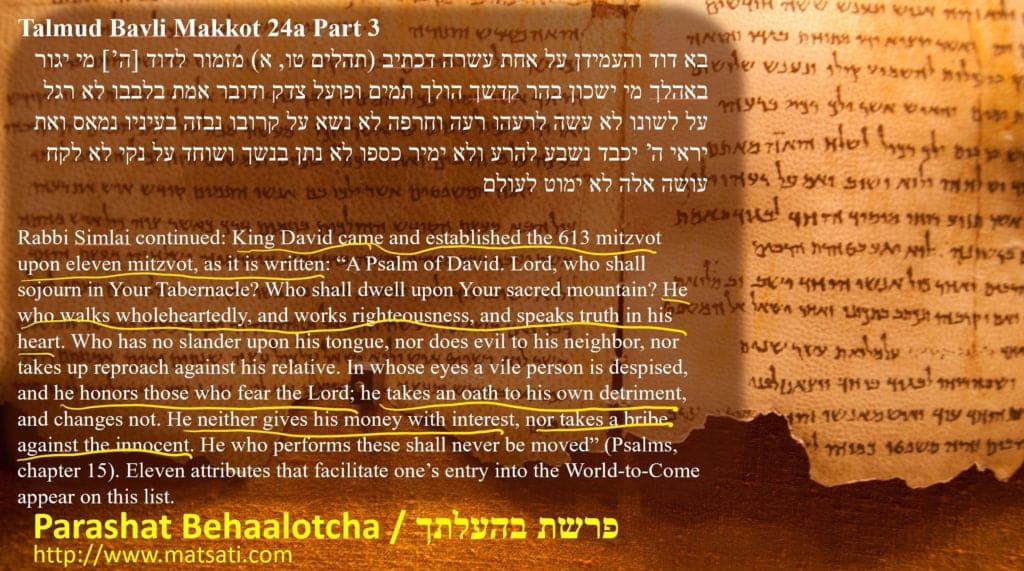
Talmud Bavli Makkot 24a Part 17
בא ישעיהו והעמידן על שש דכתיב (ישעיהו לג, טו) הולך צדקות ודובר מישרים מואס בבצע מעשקות נוער כפיו מתמוך בשוחד אוטם אזנו משמוע דמים ועוצם עיניו מראות ברע
Rabbi Simlai’s exposition continues: Isaiah came and established the 613 mitzvot upon six, as it is written: “He who walks righteously, and speaks uprightly; he who despises the gain of oppressions, who shakes his hands from holding of bribes, who stops his ears from hearing blood, and shuts his eyes from looking upon evil” (Isaiah 33:15).
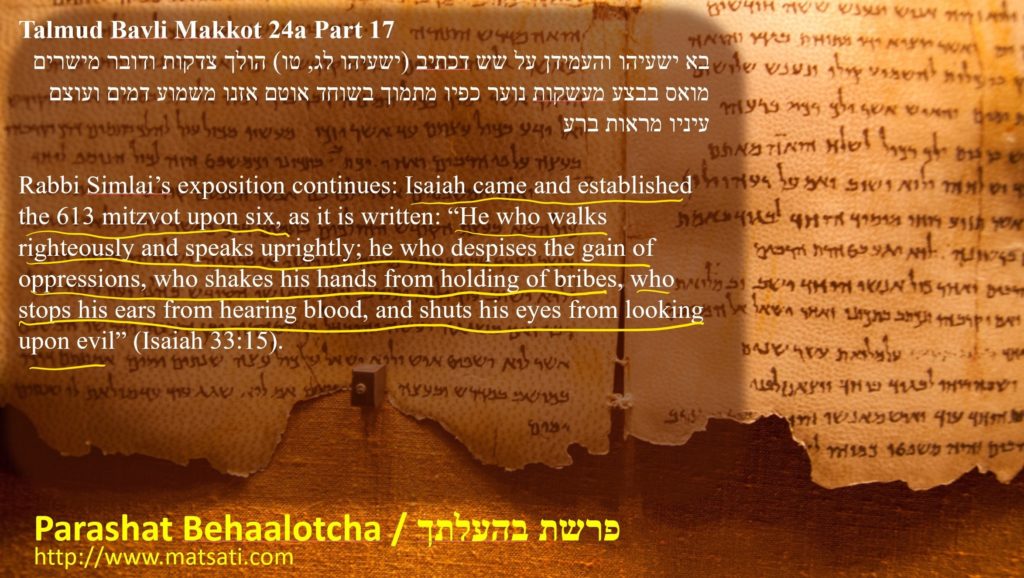
Talmud Bavli Makkot 24a Part 25
בא מיכה והעמידן על שלש דכתיב (מיכה ו, ח) הגיד לך אדם מה טוב ומה ה’ דורש ממך כי אם עשות משפט ואהבת חסד והצנע לכת עם (ה’) אלהיך
Micah came and established the 613 mitzvot upon three, as it is written: “It has been told to you, O man, what is good, and what the Lord does require of you; only to do justly, and to love mercy, and to walk humbly with your God” (Micah 6:8).
Talmud Bavli Makkot 24a Part 27
חזר ישעיהו והעמידן על שתים שנאמר (ישעיהו נו, א) כה אמר ה’ שמרו משפט ועשו צדקה בא עמוס והעמידן על אחת שנאמר (עמוס ה, ד) כה אמר ה’ לבית ישראל דרשוני וחיו מתקיף לה רב נחמן בר יצחק אימא דרשוני בכל התורה כולה אלא בא חבקוק והעמידן על אחת שנאמר (חבקוק ב, ד) וצדיק באמונתו יחיה
Isaiah then established the 613 mitzvot upon two, as it is stated: “So says the Lord: Observe justice and perform righteous-ness” (Isaiah 56:1). Amos came and established the 613 mitzvot upon one, as it is stated: “So says the Lord to the house of Israel: Seek Me and live” (Amos 5:4). Rav Naḥman bar Yitzḥak objects to this: There is no proof that the verse in Amos is establishing all the mitzvot upon one; say that Amos is saying: Seek Me throughout the entire Torah, as the verse does not specify the manner in which one should seek the Lord. Rather, say: Habakkuk came and established the 613 mitzvot upon one, as it is stated: “But the righteous person shall live by his faith” (Habakkuk 2:4).
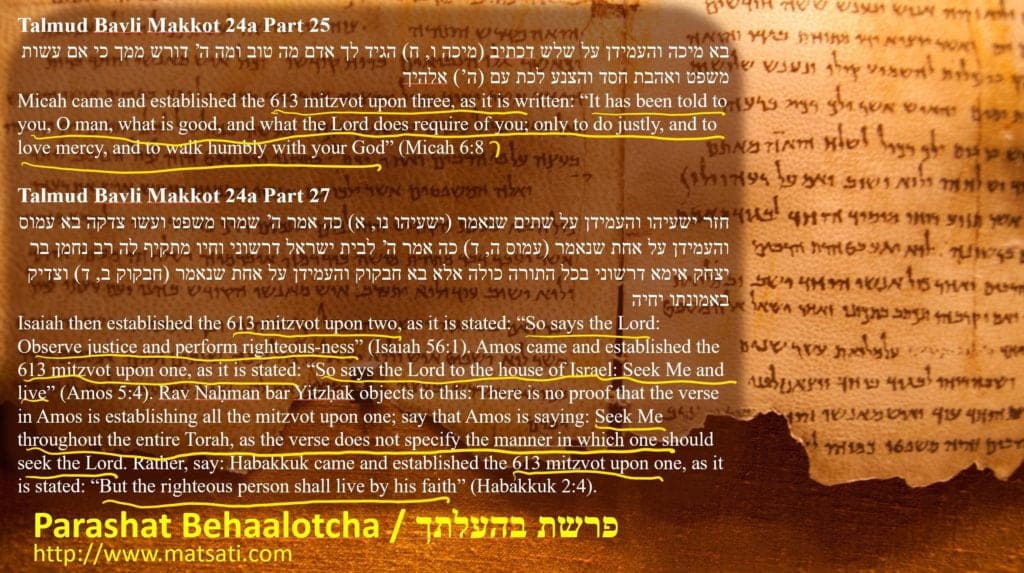
The whole section from the Talmud Bavli in Makkot 24a is quite interesting to read how the rabbis argue from the Scriptures. To summarize, the Talmud Bavli Makkot 24a states that Moshe gave Israel 613 commandments, David reduced them to eleven (Tehillim / Psalm 15), Isaiah reduced to six (Isaiah 33:15-16), Micah reduced to three (Micah 6:8), Isaiah reduced them again to two (Isaiah 56:1); but it was Habakkuk who gave the one essential commandment: וְצַדִּ֖יק בֶּאֱמוּנָת֥וֹ יִחְיֶֽה, “the righteous, by his faithfulness – shall be / exist.” Similarly, according to the New Testament, the apostle Paul had also distilled the various commandments of the Torah to this same principle of faith (see Romans 1:17, Galatians 3:11, and Hebrews 10:38). This small phrase, consisting of only three Hebrew words, sums up and restates the essential meaning of the First Commandment. This is the axis-point (point of rotation) by which our salvation hinges. The reason being, within the concept of love, the very thing the Torah is instructing us, boils down to the reason why we obey the Lord God our Father in Heaven. In addition, this love of God demonstrated by His presence in our lives reveals the truth of the matter that we are justified by our faith in God which is the basis for all the other commandments. The Lord God Almighty is אל אמונה “the Faithful God.” The Scriptures, in both the Tanakh and the NT text states that the righteous person shall live by putting his or her trust in the faithfulness and righteousness of God. Yeshua also said our faith in Him the Messiah leads to our believing in the one who sent him! The concepts of sanctification, righteousness, redemption, deliverance, and freedom all come from the Torah text as God working a miracle in our lives just as he did according to what we are reading in this week’s Torah portion, Parashat Behaalotcha. These things were then further expounded upon in the NT commentary on Yeshua and the redemption that we have from sin in Him! This is why Paul wrote what he did concerning Yeshua as saying in “whom God made our wisdom and our righteousness and sanctification and redemption” (1 Corinthians 1:30). These things are true as experiencing the power and the presence of God in our lives, just as we are reading about how God worked in the lives of others so many years ago! And because of Yeshua and what He has done, every man, woman, or child on this planet has the opportunity to experience this truth too as Yeshua made a way for all peoples of every tribe, nation, and tongue to receive salvation from the God of Israel! Such a wonderful salvation we have as we are told according to the Scriptures!
